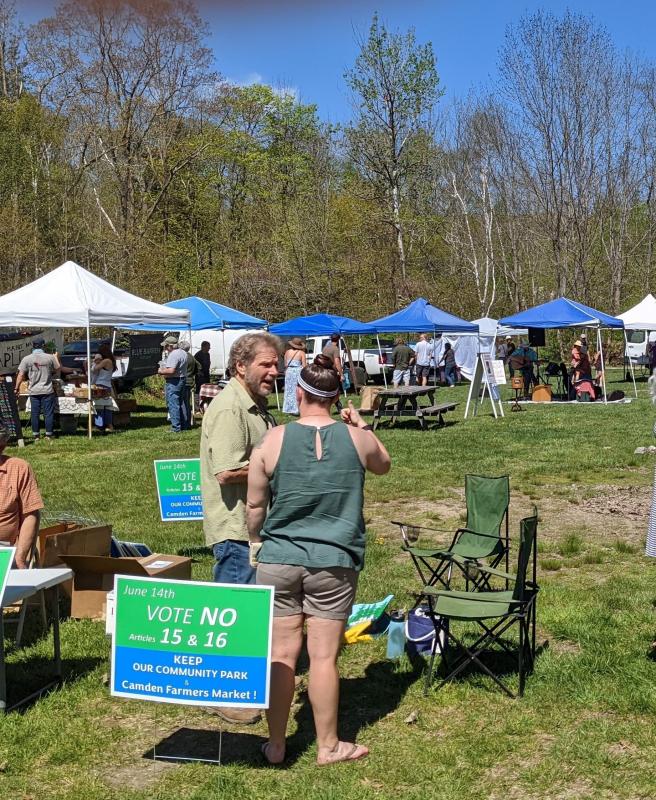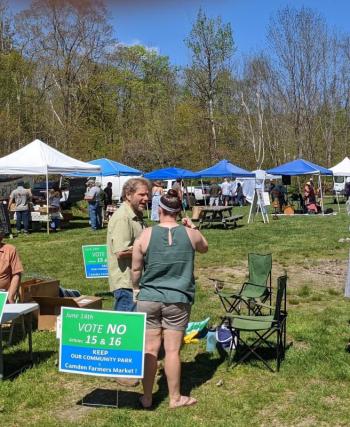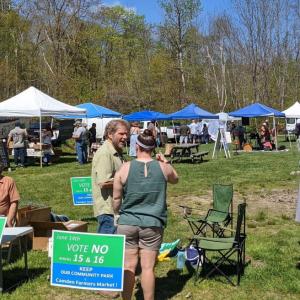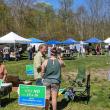Seeking Clarity on Tannery Park?
Should the town of Camden continue to own the Apollo Tannery property along the Megunticook River on Washington Street and keep it for a farmers’ market and park? Or should that property be sold for commercial development? It seems that’s the question-behind-the-question we Camden voters will be answering with our votes on Articles 15, 16 and 17 of the town warrant on June 14. Unfortunately, it isn’t a question that will appear on the ballot.
The wording of Articles 15, 16 and 17 deals with a related but different issue: Will the voters authorize the Select Board to negotiate a contract to sell the Tannery property for a commercial development, involving a “flexible incubator workshop” with a central pavilion and an unspecified “availability” for a farmers’ market, along the lines of Rockland developer Michael Mullins’ 2020 “Cranesport” proposal?
Or do Camden residents want to keep the right to vote up or down on any contract to dispose of that property, after it has been negotiated -- as town law has required for years?
Anyone who wants the town to keep the Tannery property – for a park or for some other use -- should vote “no” on Articles 15 and 16 and “yes” on Article 17.
Anyone who thinks it might be OK for the town to sell the property, but wants the long-promised right to vote on the terms and conditions of that sale, should also vote “no” on /Articles 15 and 16 and “yes” on Article 17.
How do I know that the question-behind-the- question is whether the Tannery property should be a park or a yet-to-be-negotiated commercial project? Because Select Board members have said so at public meetings held on the issue over recent months.
At a Mar. 21 workshop, Select Board member Alison McKellar said that she hadn’t yet decided herself how she will vote on the June warrant items – that is, whether she wants the town to retain ownership of the Tannery property or keep trying to sell it. After all, the town has made some mistakes in the past in letting property get away from public ownership, she noted. (Sherman’s Point, perhaps?).
What she wants, McKellar said, is “a definitive answer” on what the voters want for the Tannery property. Select Board member Sophie Romana concurred: “Where do you want us to put our energies?” was how she phrased the question. Board Chair Bob Falciani seems to want to know something closer to what’s on the ballot: “Do you [the voters] want to continue in this direction with this site?”
Marc Ratner is the clearest: He favors keeping a town-owned “Tannery Park,” and he doesn’t favor asking the voters to approve a project before there’s a contract.
Quite why the board decided to ask such a convoluted series of questions if what it wants is a clear answer – after years of town debate on the matter – I cannot say. What I can say is that I agree with Ratner: The best use for that property is a town park. Here are some reasons why:
It’s a beautiful spot along the Megunticook River. Most of the land along the lovely stream that meanders through Camden is privately owned. There’s a river walk along a small part of it where people can see the stream in its free-flowing state – and that’s mostly on the Tannery property. Even if the River Walk is eventually extended, the tannery will likely have the most space for those who want to sit and picnic, or watch their children play, or visit with friends and relatives within sight of the river– things people regularly do at the Tannery property, even in its current disheveled state.
The town has other parkland, mostly down near the harbor and at the Shirt Tail Point swimming spot on a dammed part of the Megunticook. These are treasures. The Tannery Park could be a treasure, too, providing different and important benefits: sport facilities, including informal music performance space – and most important, a farmers’ market.
Town-ownership provides by far the best guarantee that farmers will continue to ply their delicious wares in central Camden, creating an atmosphere of camaraderie and community spirit, to a soundtrack of local music, that makes Saturday mornings and Wednesday afternoons joyfully memorable.
The warrant specifics there must be “availability” of a place for a farmers’ market if the property is sold to Mullins. But it doesn’t say how big the space must be or how long it has to be there. Farmers market representatives have told the select board they don’t think the project Mullins outlined in 2020 would be “a tenable one for most of our vendors.” As a result, the farmers are already considering other locations, some not in Camden.
Mullins says he once spoke to someone from the farmers’ market, and he’s open to talk. The farmers generally say they haven’t heard from him at all. The point is, it’s uncertain and there’s a good chance Camden could lose the market that is so important to so many. The best way to keep it is to vote “No” on Articles 15 and 16 on June 14.
And in case you were wondering, neither the sale of the property nor any taxes that might ever be paid on it will earn enough for the town that anyone would notice it in their tax bill. Also, any pollution that may remain on the site from the Tannery operation will have to be paid for by the town and any state or federal grants it may obtain. No commercial developer, Mullins included, will buy the property until the environmental risk is determined and removed.
Finally, it’s worth recalling that the plan put forward by the Friends of Tannery Park for a park on the site included three or four affordable housing units to be built by Habitat for Humanity, which had a separate proposal to do the same thing.
We have a potential treasure with Tannery Park. It shouldn’t be treated as the troubled old industrial site in the way it too often is. It shouldn’t be used as a dumping ground for roadbuilding materials and equipment. It should be valued for the beautiful spot it is. If you haven’t already, go to a farmers’ market some Saturday morning before June 14. Once you’ve seen the market, you’re almost certain to vote “no” on Articles 15 and 16.





























